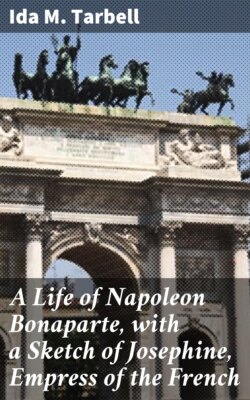Читать книгу A Life of Napoleon Bonaparte, with a Sketch of Josephine, Empress of the French - Ida M. Tarbell - Страница 8
CHAPTER III
NAPOLEON AND ROBESPIERRE—OUT OF WORK—GENERAL-IN-CHIEF OF THE ARMY OF THE INTERIOR
ОглавлениеThe favors granted Napoleon for his services at Toulon were extended to his family. Madame Bonaparte was helped by the municipality of Marseilles. Joseph was made commissioner of war. Lucien was joined to the Army of Italy, and in the town where he was stationed became famous as a popular orator—“little Robespierre,” they called him. He began, too, here to make love to his landlord’s daughter, Christine Boyer, afterwards his wife.
The outlook for the refugees seemed very good, and it was made still brighter by the very particular friendship of the younger Robespierre for Napoleon. This friendship was soon increased by the part Napoleon played in a campaign of a month with the Army of Italy, when, largely by his genius, the seaboard from Nice to Genoa was put into French power. If this victory was much for the army and for Robespierre, it was more for Napoleon. He looked from the Tende, and saw for the first time that in Italy there was “a land for a conqueror.” Robespierre wrote to his brother, the real head of the government at the moment, that Napoleon possessed “transcendent merit.” He engaged him to draw up a plan for a campaign against Piedmont, and sent him on a secret mission to Genoa. The relations between the two young men were, in fact, very close, and, considering the position of Robespierre the elder, the outlook for Bonaparte was good.
That Bonaparte admired the powers of the elder Robespierre, is unquestionable. He was sure that if he had “remained in power, he would have reëstablished order and law; the result would have been attained without any shocks, because it would have come through the quiet exercise of power.” Nevertheless, it is certain that the young general was unwilling to come into close contact with the Terrorist leader, as his refusal of an offer to go to Paris to take the command of the garrison of the city shows. No doubt his refusal was partly due to his ambition—he thought the opening better where he was—and partly due, too, to his dislike of the excesses which the government was practising. That he never favored the policy of the Terrorists, all those who knew him testify, and there are many stories of his efforts at this time to save émigrés and suspects from the violence of the rabid patriots; even to save the English imprisoned at Toulon. He always remembered Robespierre the younger with kindness, and when he was in power gave Charlotte Robespierre a pension.
Things had begun to go well for Bonaparte. His poverty passed. If his plan for an Italian campaign succeeded, he might even aspire to the command of the army. His brothers received good positions. Joseph was betrothed to Julie Clary, and life went gayly at Nice and Marseilles, where Napoleon had about him many of his friends—Robespierre and his sister; his own two pretty sisters; Marmont, and Junot, who was deeply in love with Pauline. Suddenly all this hope and happiness were shattered. On the 9th Thermidor Robespierre fell, and all who had favored him were suspected, Napoleon among the rest. His secret mission to Genoa gave a pretext for his arrest, and for thirteen days, in August, 1794, he was a prisoner, but through his friends was liberated. Soon after his release, came an appointment to join an expedition against Corsica. He set out, but the undertaking was a failure, and the spring found him again without a place.
In April, 1795, Napoleon received orders to join the Army of the West. When he reached Paris he found that it was the infantry to which he was assigned. Such a change was considered a disgrace in the army. He refused to go. “A great many officers could command a brigade better than I could,” he wrote a friend, “but few could command the artillery so well. I retire, satisfied that the injustice done to the service will be sufficiently felt by those who know how to appreciate matters.” But though he might call himself “satisfied,” his retirement was a most serious affair for him. It was the collapse of what seemed to be a career, the shutting of the gate he had worked so fiercely to open.
He must begin again, and he did not see how. A sort of despair settled over him. “He declaimed against fate,” says the Duchess d’Abrantès. “I was idle and discontented,” he says of himself. He went to the theatre and sat sullen and inattentive through the gayest of plays. “He had moments of fierce hilarity,” says Bourrienne.
A pathetic distaste of effort came over him at times; he wanted to settle. “If I could have that house,” he said one day to Bourrienne, pointing to an empty house near by, “with my friends and a cabriolet, I should be the happiest of men.” He clung to his friends with a sort of desperation, and his letters to Joseph are touching in the extreme.
